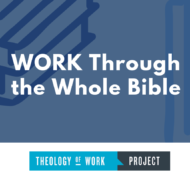39: Sin and the promise of restoration (Malachi 3)
Devotional / Produced by TOW Project
Scripture Reading: Malachi 3
Even in times of restoration, human sin is never far away. Malachi, the third of the restoration prophets, complains that some of the people begin to profit by defrauding laborers of their wages. Not surprisingly, such people also pollute the temple worship by stinting what they contribute in offerings, and as a result the environment is also degraded.
Yet the hope of the prophets remains, and work is at the center of it. It begins with a promise to restore the religious/social infrastructure of the temple: “See, I am sending my messenger to prepare the way before me, and the Lord whom you seek will suddenly come to his temple. The messenger of the covenant in whom you delight—indeed, he is coming, says the Lord of hosts” (Mal. 3:1). It proceeds with the restoration of the environment; people go about their work ethically (Mal. 3:14, 18), and as a result the economy is restored, including “the produce of your soil” and “your vine in the field” (Mal. 3:11b).
Prayer: Lord, your Word seems to indicate that work done ethically results in blessing and restoration. Help me go about my work ethically. Amen.
For Further Exploration: Read Both Sin and Hope Remain Present in Work (Malachi 1:1-4:6) from the Theology of Work Bible Commentary.
Popular Content
Popular Content
Table of Contents
-
Work Through the Whole Bible Devotional Plan
- 39: Sin and the promise of restoration (Malachi 3)
Donate
Copyright
Author: Theology of Work Project.
Theology of Work Project Online Materials by Theology of Work Project, Inc. is licensed under a Creative Commons Attribution-NonCommercial 4.0 International License. Based on a work at www.theologyofwork.org
You are free to share (to copy, distribute and transmit the work), and remix (to adapt the work) for non-commercial use only, under the condition that you must attribute the work to the Theology of Work Project, Inc., but not in any way that suggests that it endorses you or your use of the work.
© 2014 by the Theology of Work Project, Inc.
Unless otherwise noted, the Scripture quotations contained herein are from the New Revised Standard Version Bible, Copyright © 1989, Division of Christian Education of the National Council of the Churches of Christ in the U.S.A., and are used by permission. All rights reserved.





